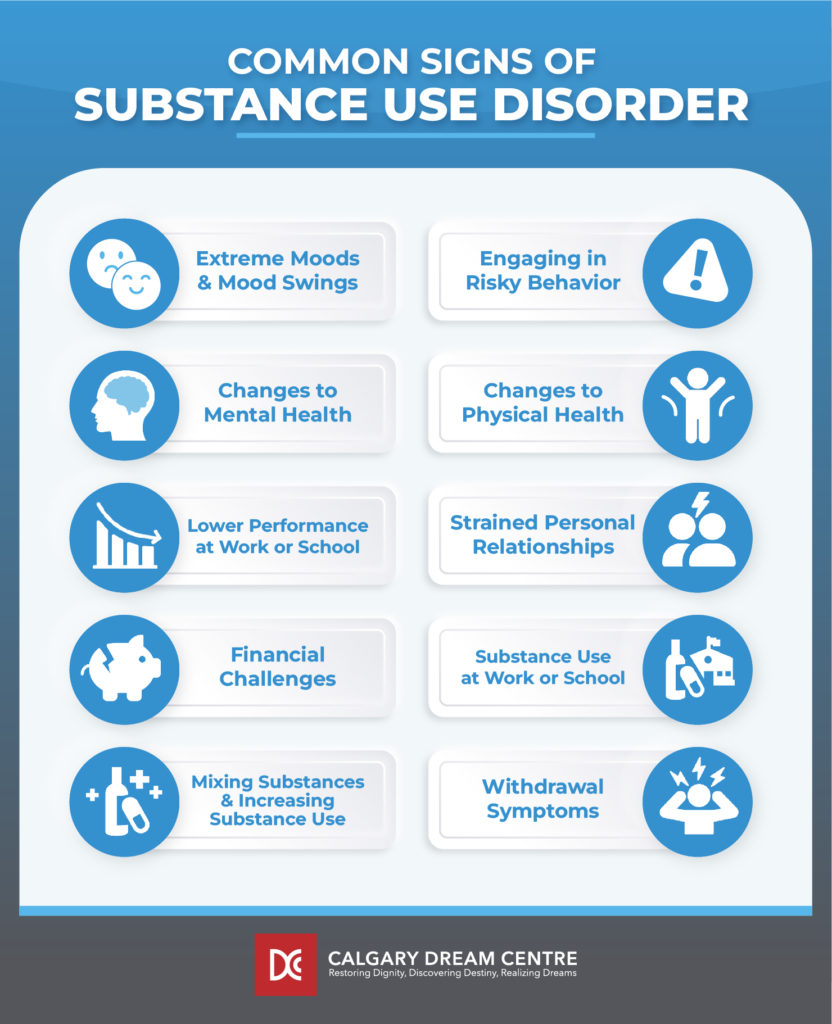Substance use disorder—commonly known as addiction—is a complex medical condition that can affect people differently. Substance use is common for many people and occurs at many different levels, so it can be difficult to know when a person’s behaviour and habits signal a change from beneficial or low-risk use to high-risk use and substance abuse disorder.
The signs of substance use disorder (addiction) include:
- Changes to a person’s personality
- Changes to a person’s habits related to drugs and alcohol
- Challenges with managing daily life due to increased drug and alcohol use
- Physical symptoms related to withdrawal
Just as each person’s experiences with substance use disorder can vary, so too can recovering from addiction follow a different path for different people. Understanding what addiction is and how it affects people can be the first step to helping someone you know consider their options for addiction treatment programs.

What Are the Signs & Symptoms of Addiction?
The exact effects of substance use disorder can vary based on the substances a person is using, their personal health, their mental health, their social health, and other isolated factors.
While each specific case of addiction may vary for those affected, there are some common signs you can look for. Paying attention to changes in a person’s behaviour, habits, and health can make it easier to spot signs that they may be affected by addiction.
Changes to a person’s personality that may be a sign of addiction include:
- Choosing to isolate themselves from others
- Extreme mood swings, anger, anxiety, or depression
- Challenges with memory, concentration, and alertness
- Risky behaviour (especially to get and use drugs and alcohol)
- A lack of interest in activities they once enjoyed
Changes to a person’s habits that may be a sign of addiction include:
- Using drugs or alcohol in the morning, at school, or at work
- Using more drugs or alcohol to get the same effect
- Using substances more often
- Using substances alone
- Spending more money on drugs or alcohol
- Using substances as a coping mechanism
- Choosing activities or friends based on substance use
- Trying new substances or mixing substances to increase their effects
Challenges with daily life that can be signs of drug and alcohol addiction include:
- Lower productivity at work
- Lower grades at school
- Absences from school or work
- Decreased personal health
- Unstable finances
- Strained personal relationships
- Lower self-esteem
Physical withdrawal symptoms that may be a sign of addiction include:
- Nervousness
- Anger and irritability
- Chills
- Sweating
- Indigestion
- Nausea
- Stomach pain
- Insomnia and changes to sleeping patterns
- Widespread aches and pains
Not all of the signs and symptoms above are strictly signs of a person affected by substance use disorder—they may be signs of other mental and physical health conditions.
However, if you notice a friend or family member dealing with the issues above, speaking with them about those signs and symptoms may be a good first step toward helping them get support for the challenges they may be experiencing.
Addiction has a link to mental health, trauma, stress, and many other challenges a person may face. An individual’s path to recovery can be complex and may involve taking steps to understand the other problems that may be contributing to their substance use habits.
Understanding Addiction & Recovery
It is important to understand that not everyone who consumes drugs or alcohol is experiencing substance use disorder. Rather, substance use is a spectrum, and addiction occurs at one end of that spectrum.
Substance use disorder (addiction) is a treatable medical condition that affects a person’s brain and involves continuous, compulsive substance use despite the negative consequences and effects their substance use may have for themselves and the people around them.
What Is the Difference Between Substance Use & Addiction?
There are different forms of substance use that are not considered addiction. The different types of substance use range from non-use (total abstinence) and beneficial use, such as taking medication as prescribed by a doctor, to high-risk use.
How Does Addiction Recovery Work?
It is important to recognize that recovery from addiction is a personal choice and the process can look different for everyone. Recovery may or may not involve complete abstinence, but may also involve medication-assisted treatment and other programs meant to support a person’s mental, physical, and social well-being.
How to Talk to a Friend or Family Member About Their Substance Use
Helping someone affected by addiction get treatment can be complicated and difficult. It’s important to remember that the choice to seek support through a recovery program is an individual choice. However, that doesn’t mean there isn’t anything you can do to help.
Speaking with friends or family members affected by addiction about how their substance use is affecting them and the people around them can be a helpful first step toward promoting understanding and recovery.
Be Informed
It is informed to approach conversations about substance use from an informed point of view. Take the time to learn more about addiction, the stigmas related to substance use, and different types of substances and their health risks.
Be Understanding
The goal of your conversation should be to show you care about the person you are speaking with and that you are concerned about their health, but you should also be open and understanding.
Be prepared to listen and try to understand the challenges they may be facing that contribute to substance use and those that may be caused by substance use.
Be Patient
Speaking about substance use can be challenging, and the person you are talking to may feel defensive. Be patient with the conversation, and be open to taking breaks.
It’s important to understand that recovery takes time. Don’t expect an immediate response or change in behaviour, and respect that it may take a person some time to fully understand, accept, and recognize the scope and effect of substance use in their life.

Where to Get Support for Substance Use
Helping someone affected by addiction can be challenging, but you don’t have to do it alone. At the Calgary Dream Centre, we strive to guide those affected by substance use disorder and help them take steps toward recovering from addiction to live purposeful lives through recovery programs and housing support.
If you or someone you know is ready to get started on the path to recovery, please feel free to contact us and learn more about our approach to helping those affected by addiction with mercy, compassion, respect, integrity, accountability, and innovation.



